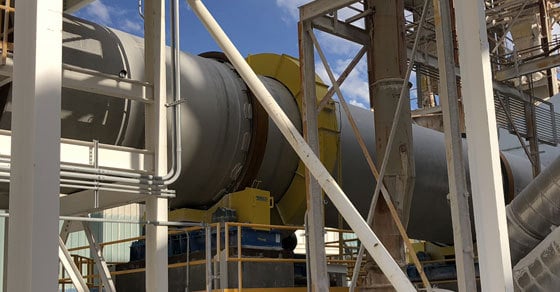COVID-19 has impacted businesses and industries in ways that none of us would have ever thought possible, disrupting supply chains and causing quarantine-related shutdowns of factories and even entire cities.
Just when it seems there are no silver linings, however, companies are finding that they can achieve gains by investing in their existing infrastructure, putting aftermarket service teams in high demand. The FEECO Customer Service Team is no exception and has been answering calls from around the country for a variety of services.
We sat down with FEECO Customer Service and Lab Manager Craig Peppin for some insight on how the pandemic is driving the service market for process equipment.
Services in High Demand
As Peppin explains, those doing well during the pandemic are using the time strategically, taking advantage of the lull by making necessary improvements and getting critical repairs taken care of.
“The best time to do these things is now, when things are slow and plant managers can work around a more flexible production schedule,” Peppin explains. “Using this time to take a preventative maintenance approach is much more efficient than waiting until something breaks down mid-production and trying to bring someone in at the last minute. By using this time more strategically, plant managers can make sure they’re ready to hit the ground running when things pick up again.” Peppin notes that the services most in demand from FEECO right now are rotary drum alignments, tire and trunnion grinding, equipment and process audits, spare parts and replacement components, and remote support.
Rotary Drum Alignments
Rotary drums are a major capital investment and often the backbone of the process in which they are operating. As such, it can be hard to find the time to address normal wear and tear. One aspect of maintenance that should not be overlooked, however, is routine drum realignment; the crucial and expansive role that rotary drum alignment plays in the overall longevity of the drum makes it essential as a preventative maintenance tool.
Rotary drums, whether they are serving as dryers, coolers, kilns, or otherwise, naturally fall out of alignment over time. This puts added stress on the mechanical and structural components of the drum, which, if allowed to continue, promotes increased wear on all components and could result in catastrophic failure if not managed in time.
“Our guys use an advanced laser tracking system to perform drum alignments,” Peppin says. “Our customers love it because not only does the alignment process go faster, but the laser system provides a more precise alignment than traditional methods.”
Tire & Trunnion Grinding
Tire and trunnion wheel grinding services have also been in high demand during the pandemic. “Similar to drum alignment, any sort of wear on the tires or trunnions creates an imbalance in the entire system that can exacerbate wear on other components,” Peppin explains. “Tire and trunnion wear is a lot easier to identify, because you can physically see it,” he notes, adding that “any sign of wear on tires or trunnions should be treated immediately to avoid further damage.”
Equipment & Process Audits
The FEECO Customer Service Team has also seen a rise in equipment and process audits, which take a systematic approach to assessing and optimizing the condition of a single piece of equipment, or overall process system.
While equipment audits look at optimizing the physical and mechanical components of a piece of equipment, essentially serving as a tune-up, process audits evaluate how the process is performing and where efficiencies are lost.
“A lot of plants experience inefficiencies that may seem small on a day-to-day basis, but really add up in the long term,” Peppin says. “Using this time to fix some of those issues can really contribute to the bottom line, and that helps out in times like these. It saves money in the long run as well, by promoting equipment longevity,” he adds.
Parts & Replacement Components
Plant managers are also using this time to replace worn parts and components. “It’s something we’re seeing a lot of: many plant managers tend to hold off as long as possible on making these repairs, which ends up costing them more in the long run, because the equipment breaks down during production. But many are recognizing this time as an opportunity to get ahead on replacing some of those worn components so production won’t be affected later.”
Remote Support
Not surprisingly, remote support has also become a major draw, as facilities look to limit their encounters with the outside world while still keeping things running smoothly.
“We were already working on building remote support into our service model,” Peppin explains. “COVID just helped us accelerate that process and think about it less as an added-value service and more as a necessity. Now we’re helping our customers troubleshoot and resolve many of their problems through virtual support avenues.”
Rebuilds and Restarts
In addition to driving demand for more conventional services, the coronavirus has been pushing work into the service industry in another way as well. After highlighting the weaknesses of global supply chains, causing many companies to rethink their sources, some companies are looking at previously shuttered operations as a way to jumpstart the process of securing more local supplies. While it’s likely there will be an influx of activity in the long term aimed at new infrastructure to support this effort, in the meantime, bringing mothballed facilities back online is a good way to alleviate some of that pressure.
“We’re going in and evaluating the condition of equipment and assessing what needs to be done to optimize the equipment based on the needs of the intended operation,” Peppin states.
Earlier this year, a Gartner Inc. survey found that 25% of respondents had already localized manufacturing to be in closer proximity to demand.
How the FEECO Customer Service Team has Responded
FEECO understands that while the pandemic provides a valuable opportunity to get ahead on plant maintenance, that shouldn’t come at the cost of potential exposure to the virus.
The FEECO Customer Service Team has been working closely with clients to ensure service is conducted safely during the pandemic with minimal in-person interaction. This includes following CDC guidelines on social distancing and PPE, as well as adhering to rigorous internal safety standards.
“Our guys are happy to be in the field doing what they love, but they know it demands a high level of commitment to safety, beyond our already-stringent standards. They’ve done an excellent job in meeting that commitment and allowing us to continue the work our customers depend on,” Peppin affirms.
Conclusion
While the coronavirus pandemic is taking its toll on nearly every aspect of business, one silver lining is that it is putting process equipment service teams to work at a rate higher than normal. Plant managers using the time strategically to take care of essential preventative maintenance are setting themselves up for a smooth transition on the road back to normalcy.
With safety as their top priority, the FEECO Customer Service Team is committed to bringing customers tire grinding, laser alignment, process and equipment audits, and other critical maintenance services during the COVID-19 pandemic. For more information on our parts and service support, contact us today!



